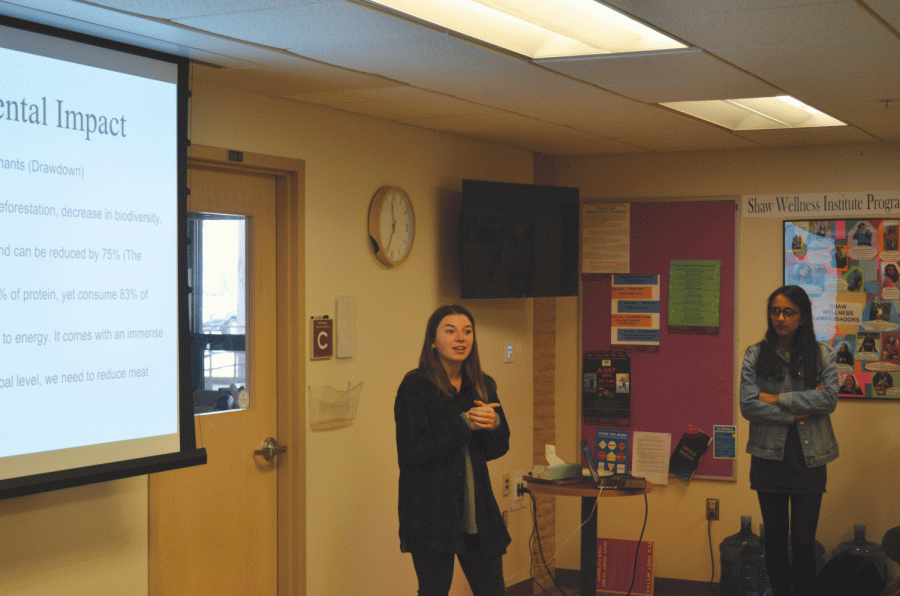Plate and Planet: Eating Habits and Their Impact
Everyone can relate to the feeling of getting hungry and going to the kitchen to find something to eat. Most people will open their fridge, quickly survey their options and settle for whatever looks most appetizing. In these moments, individuals are more concerned with satisfying their hunger than the consequences of their specific food choices. However, people must break this bad habit because day-to-day eating routines significantly impact an individual’s physical health and their surrounding environment.
On Thursday, March 28, the Office of Sustainability and the Shaw Wellness Institute co-sponsored a “Plate and Planet” Brown Bag with hopes of encouraging members of the community to make healthier and more conscious decisions when it comes to the kinds of food they eat. The Brown Bag effectively outlined certain diets that promote sustainable eating and provided students with helpful tips on how to successfully navigate Colgate Dining and Hamilton restaurants.
Senior Madison Smith and Sophomore Jaanvi Sachdeva, interns at Colgate’s Office of Sustainability, began the event by asking the audience about their typical eating habits. From this open discussion, it became clear that most people do not make mindful food choices or know where the majority of their food comes from. Although this was a slightly alarming revelation, it emphasized the necessity of educating people about sustainable eating. Fortunately, Smith and Sachdeva shared useful information with the group from their background in environmental studies.
“The food industry has been the most interesting aspect of my environmental studies education and is something that I am hoping to go into later on,” Smith said.
For starters, Smith and Sachdeva shared shocking statistics related to the environmental impacts of meat. Raising animals on a farm for meat production not only requires a significant amount of land, often causing deforestation and a decline in biodiversity, but it also releases greenhouse gas emissions into the atmosphere which can lead to air pollution and global warming. As a result, many environmental scientists believe that global meat consumption should drastically be reduced and that people should switch to plant-based diets. The two most common and effective plant-based diets include vegetarianism and veganism. Both of these diets are advantageous to the environment as no animals are harmed and greenhouse gas emissions are reduced.
After outlining the benefits of these plant-based diets, Smith and Sachdeva continued their presentation by providing useful tips on how to navigate Colgate’s dining halls and Hamilton restaurants. Smith and Sachdeva encourage students to eat at Frank rather than at the Coop in order to avoid the use of disposable containers. Within Frank, members of the Colgate community can make environmentally conscious food choices by selecting vegetarian options, eating locally grown root vegetables located in the back of the dinning hall and reducing portion sizes in order to avoid food waste. Moreover, students and faculty can eat sustainably in the town of Hamilton by exploring restaurants such as the Hamilton Eatery, Hamilton Whole Foods, the Royal Indian Grill and Oliveri’s, which all have vegetarian options on their menus.
As the “Plate and Planet” Brown Bag came to a close, Smith and Sachdeva emphasized the importance of prioritizing healthy and environmentally friendly foods. However, they also reminded the audience that individual wellness is equally as important. In order to sustain the environment, people must listen to their bodies and, most importantly, sustain themselves.
Contact Sarah Speegle at [email protected].







